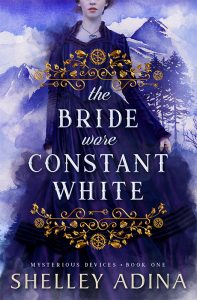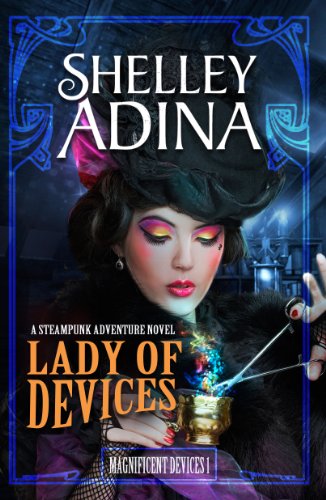The Bride Wore Constant White—final excerpt
 Copyright 2018 by Shelley Adina
Copyright 2018 by Shelley Adina
Chapter 1 (continued)
Miss Makepeace nodded. “I have been writing to Mr. Bjorn Hansen, of Georgetown, for some months now, and am convinced that he will make me a good husband.” She touched the exceedingly modest diamond upon the fourth finger of her left hand. “He sent this in his last letter, and I sent my acceptance by return airship.”
“My goodness,” Freddie breathed. “I have never met a mail-order bride. I thought they only existed in the flickers—you know, like Posted to Paradise.” She and Daisy had stood in the queue outside the nickelodeon on Milsom Street for half an hour to see that one, much to their aunt’s disgust. But it had been so romantic!
“We are quite real, I assure you.” Two dimples dented Miss Makepeace’s cheeks. “My dress and veil are in my trunk. Mr. Hansen will meet the train when I alight in Georgetown, and we will be married two days later in the First Presbyterian Church on Taos Street. It is all arranged.”
“Where is Georgetown, exactly?” Daisy asked.
Not that it mattered—she and Frederica were bound for Santa Fe, on a quest that could not be postponed. Their father, Dr. Rudolph Linden, RSE, had been missing for nearly two years. Influenza had taken their mother last winter—hastened, Daisy was certain, by the anxiety and depression she had suffered after his mysterious disappearance. Now that she had reached her majority, Daisy was determined to take up the search where her mother had left off. And this time, if love and determination meant anything, she and Freddie would find him.
“It is in the northern reaches of the Texican Territories, in the mountains,” Miss Makepeace explained in answer to her question. “From Denver, it is merely an hour west by train. It is said to be one of the loveliest towns in the territory—and certainly one of the richest. Silver, you know. It is surrounded by mines on every side, and has a bustling economy, I am told.”
A young man who had been passing on the way to his table now hesitated next to theirs. “I do beg your pardon. Forgive me for intruding, but are you speaking of Georgetown?”
If Aunt Jane had been sitting opposite, Daisy had no doubt there would have been either a cut direct—or an invitation to breakfast if she thought the young man might be good husband material. But they were en route for the Americas, where one might stop and strike up a conversation without having to be formally introduced by a mutual acquaintance—or to give one’s family antecedents back four generations.
“We are, sir. Do you know it?”
His square, honest face broke into a smile, and Daisy noted with interest the quality of the velvet inset into the lapels of his coat, and the leaf-brown color of his trousers—not the dull brown of earth, but the warmer tones of the mast on the forest floor.
“I am bound there as well. Do allow me to introduce myself. My name is Hugh Meriwether-Astor, originally from Philadelphia. I have recently bought a share in the Pelican mine.”
“And are you going out to inspect your investment, or have you been there before?” Miss Makepeace asked.
“This is my first visit. I’m afraid I have an ulterior motive—that of escaping the bad temper of my older brother, who is not quite so conservative in his business dealings, for the summer. I should like to get my hands dirty, and do a little excavating myself if I can, before I go back to law school. And you?”
As the eldest, and practically a married woman, Miss Makepeace made the introductions. Daisy noted that she did not vouchsafe any personal details of their voyage, she supposed because she had no personal observations of her future home to offer him. They parted with promises of seeing one another at the card tables after dinner, and the young man continued to his table by the viewing port.
“What a nice person,” Frederica ventured. “He does not seem much older than you, Daisy, and yet he owns part of a mine. His family must be rather well off.”
“If my facts are in order, he is closely connected with the Meriwether-Astor Manufacturing Works,” Miss Makepeace said in a low tone. Heaven forbid the young man should know they were discussing him. “Surely even in Bath you will have read in the papers about his cousin, Gloria Meriwether-Astor.”
“It’s a difficult name to miss,” Daisy said. “Wasn’t she the one who singlehandedly stopped a war in the Wild West and returned home in triumph with none other than a railroad baron’s long-lost heir for a husband?”
Honestly, while it might have been quite true, it did sound like one of the sensational plots beloved of the flickers.
“I am quite sure it wasn’t singlehandedly,” Miss Makepeace said. “But I will say that the union of two such industrial fortunes made headlines in the Fifteen Colonies, and London and Zurich as well. It was all any of my father’s cronies talked of at dinner for weeks.”
“My friend Maggie knows her,” Freddie said most unexpectedly. “Gloria, I mean. Mrs. Stanford Fremont.”
“Nonsense,” Daisy said repressively. “Another of that girl’s absurd fabrications.”
“It isn’t!” Freddie drew back, affronted, and refused to speak for the rest of their meal.
There were some blessings for which one could only be thankful.
*
For more, find The Bride Wore Constant White at your favorite online retailer!




